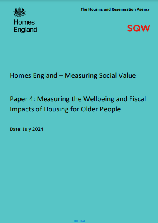Measuring the Wellbeing and Fiscal Impacts of Housing for Older People

This research and evaluation report and supplementary document by SQW for Homes England provides evidence on measuring social value in older people's housing. It is one of four reports commissioned by Homes England into social value.
Drawing on a range of published research, including the What Works Centre Wellbeing Framework and work undertaken by the Housing LIN, the report focuses on the measurement of wellbeing impacts associated with the provision of homes specifically designed to meet the needs of older people. It also looked for evidence of fiscal savings that may be generated by providing these types of homes, from:
- Age-restricted general market housing or housing is generally for people aged 55+ and the active elderly.
- Retirement living or sheltered housing, with limited communal facilities such as a lounge, laundry room and guest room.
- Extra Care housing or housing-with-care, consisting of purpose-built or adapted flats or bungalows with a medium to high level of care available if required. In some cases, these developments are known as retirement communities or extra care villages.
By applying the HM Treasury Wellbeing Guidance for Appraisal, appraisers can consider new monetised estimates of wellbeing improvements, alongside estimates of fiscal savings and other social value impacts, to present a broader view of the benefits being delivered by older people's housing schemes. These include:
- personal satisfaction ie happiness, reduced anxiety, feeling worthwhile
- relational: tackling loneliness and isolation, building social connections
- health improvements and satisfaction: addressing mental wellbeing and depression
- property related: satisfaction with home, feeling safe, neighbourhood belonging
Of particular interest, the analysis suggests that, on average residents of age-restricted general market housing (retirement living or sheltered housing and extra care housing or housing-with-care) reported higher life satisfaction scores than residents in general market housing. When monetised this equates to a value of between £4,318 and £5,264 per person.
